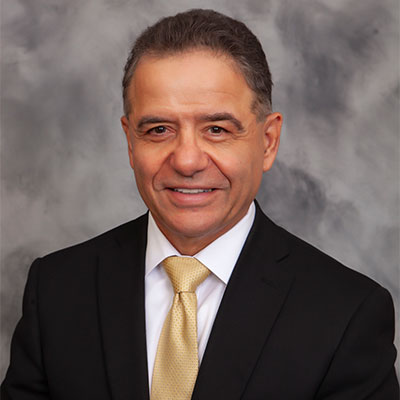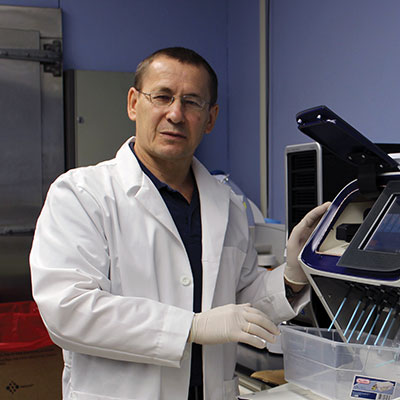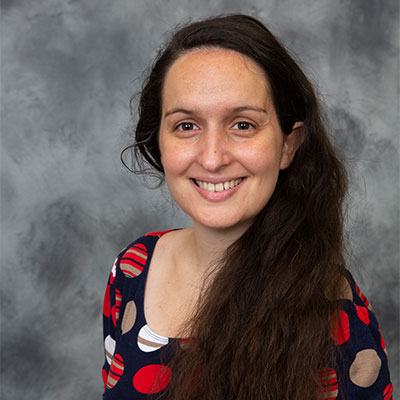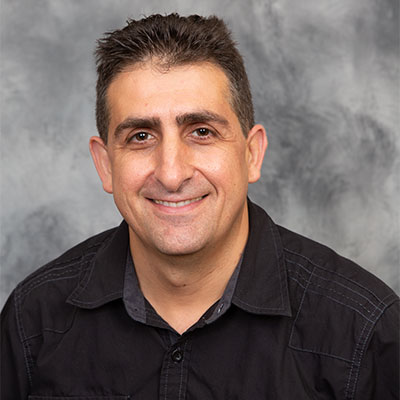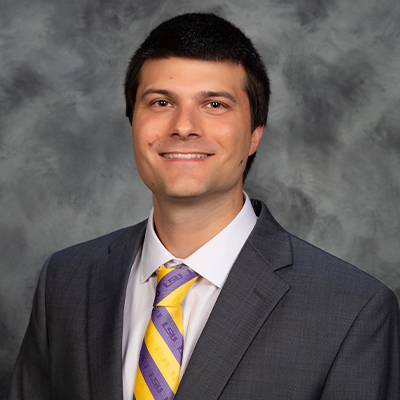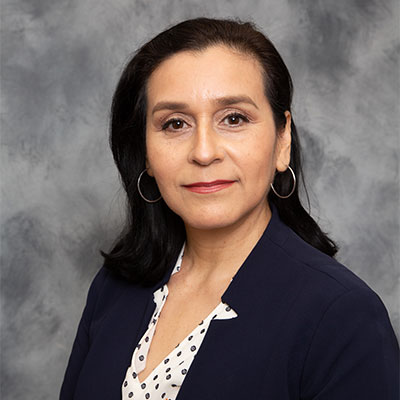Center for Lung Biology and Disease
The Louisiana Center for Lung Biology and Disease (CLBD) was established in 2019 through an 11.6 million dollar grant from the National Institutes of Health-funded Centers of Biomedical Research Excellence (COBRE). The interdisciplinary faculty of the CLBD come from the Departments of Pathobiological Sciences and Comparative Biomedical Sciences at the School of Veterinary Medicine.
The Center is committed to excellence in research and mentoring related to lung diseases. It is highly interactive, and consists of a dynamic group of junior investigators whose research focus is on understanding the molecular and cellular immunological mechanisms associated with the pathogenesis of infectious and non-infectious lung diseases using molecular, immunological, and pathological approaches in mouse models. They also use human samples to validate their findings from preclinical models.
The research projects are supported by two scientific cores, the Pulmonary Immunopathology (PIP) Core and the Molecular Biology (MB) Core. The Administrative Core (AC) will coordinate the activities of the individual projects and cores, and includes a panel of mentors with outstanding experience in lung disease research.
The Center has assembled senior scientists with outstanding track records to serve on the Internal Scientific and Advisory Committee (ISAC) and Mentoring Committee (MC) that carefully evaluate the scientific needs of each junior investigator and tailor the mentoring plan based on the individual’s need. Senior scientists with exceptional track records are included in the external advisory board (EAB).
The long-term goal is to establish a collaborative, productive, sustainable, and nationally/internationally recognized Center of Excellence (COE) in Pulmonary Disease research. The Center will provide novel insights into the pathogenesis of devastating lung diseases that guide future improved strategies for treating and preventing these and other lung diseases in the human population.
2025 Louisiana Lung Conference
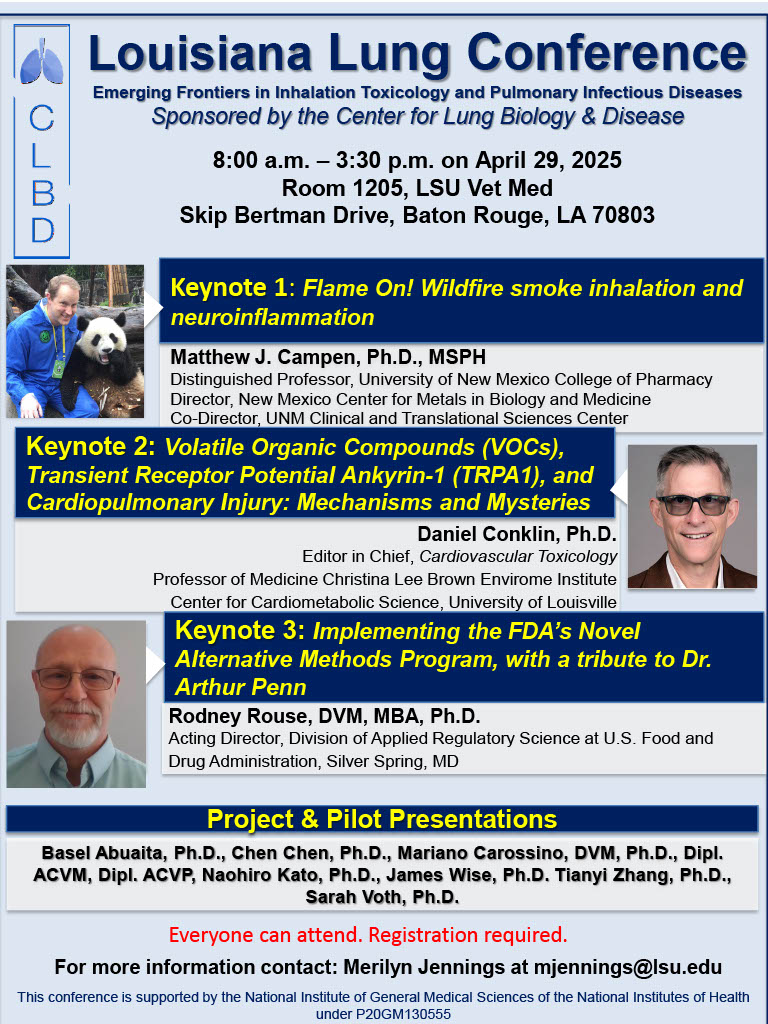
2025 Louisiana Lung Conference Agenda
Emerging Frontiers in Inhalation Toxicology and Pulmonary Infectious Diseases
Sponsored by the Center of Biomedical Research Excellence (COBRE)
April 29, 2025
LSU Vet Med 1205
| Time | Description | Speaker |
|---|---|---|
| 8 to 8:30 a.m. | Breakfast | |
| 8:30 to 8:45 a.m. | Welcome and Opening Remarks | Oliver Garden, BVetMed, Ph.D., FHEA, FCCP, FRCVS, DACVIM, DECVIM-CA, LSU Vet Med Dean |
| 8:5 to 9:30 a.m. | Keynote 1: Flame On! Wildfire Smoke Inhalation and Neuroinflammation | Matthew J Campen, Ph.D., MSPH., Distinguished Professor, University of New Mexico College of Pharmacy, Co-Director UNM Clinical and Translational Sciences Center, Director New Mexico Center for Metals in Biology and Medicine |
| 9:30 to 10 a.m. | Regulation of pulmonary host defenses by the endoplasmic reticulum stress sensor IRE1α | Basel Abuaita, Ph.D., Project Investigator, LSU Vet Med |
| 10 to 10:30 a.m. | How S. aureus protein SSL11 inhibits neutrophil migration | Chen Chen, Ph.D., Project Investigator, LSU College of Science |
| 10:45 to 11:15 a.m. | The role of adipocyte-driven inflammation and leptin pathway in pulmonary viral infections caused by SARS-CoV-2 and influenza A | Mariano Carossino, DVM, Ph.D. DACVM, DACVP, Project Investigator, LSU Vet Med |
| 11:15 a.m. to 12 p.m. | Keynote 2: Volatile Organic Compounds (VOCs), Transient Receptor Potential Ankyrin-1 (TRPA1), and cardiopulmonary injury: Mechanisms and mysteries | Daniel Conklin, Ph.D., Editor in Chief, Cardiovascular Toxicology, Professor of Medicine Christina Lee Brown Envirome Institute, University of Louisville |
| 12:00 to 12:20 p.m. | Oral delivery of fucoxanthinol to improve the target engagement for airway inflammation | Naohiro Kato, Ph.D., Pilot Project applicant, LSU Biological Sciences |
| 12:20 to 1:15 p.m. | Lunch break and Networking (lunch provided) | |
| 1:15 to 1:35 p.m. | Hexavalent chromium drives human lung carcinogenesis via lipid metabolic dysfunction | James Wise, Ph.D., Pilot Project Applicant, LSU AgCenter |
| 1:35 to 1:55 p.m. | Adjuvant-induced trained immunity against SARS-CoV-2 infection | Tianyi Zhang, Ph.D., Pilot Project Applicant, LSU Vet Med |
| 1:55 to 2:15 p.m. | Endothelial amyloids in acute Pseudomonas infection: Exoenzyme Y should we care? | Sarah Voth, Ph.D., Pilot Project Applicant, Edward Via College of Osteopathic Medicine, University of Louisiana Monroe |
| 2:15 p.m. to 3 p.m. | Keynote 3: Implementing the FDA’s Novel Alternative Methods program, with a tribute to Dr. Arthur Penn | Rodney Rouse, DVM, MBA, Ph.D., Acting Director, Division of Applied Regulatory Science, U.S. Food and Drug Administration, Silver Spring, Maryland, United States |
| 3 to 3:15 p.m. | Closing Remarks | Tammy Dugas, Ph.D., Director, Center for Lung Biology and Disease, Everett Besch Professor, Associate Dean for Research Graduate Education |
| 3:30 to 5:30 p.m. | COBRE investigators meeting with the EAC (closed session) |
People
Leadership

Tammy Dugas
PhD
Co-Director
Associate Dean for Research and Graduate Education
Professor, Department of Comparative Biomedical Sciences
Stephania Cormier
PhD
Co-Director
Associate Vice President, LSU Office of Research and Economic Development
Wiener Chair Professor, LSU College of Science
External Advisory Committee
Oliver Garden
BSc, BVetMed, PhD, DACVIM, DECVIM-CA
Committee Chair
Dean, LSU Vet Med
Samithamby "Jey" Jeyaseelan
DVM, MPhil, PhD
Professor of Pathobiological Sciences, LSU Vet Med
Frances Lund
PhD
Director of the Heersink School of Medicine (HSOOM) Immunology Institute, University of Alabama at Birmingham
Chad Steele
PhD
Chair, Department of Microbiology and Immunology
Tulane University School of Medicine
Pulmonary Immunopathology Core
Masami Yoshimura
BSc, MSc, DSc
Director
Associate Professor of Comparative Biomedical Sciences
Tomislav Jelesijevic
DVM, PhD
Co-Director
Assistant Professor of Comparative Biomedical Sciences, LSU Vet Med
Duane Jeansonne
PhD
Assistant Professor (Research) of Pathobiological Sciences, LSU Vet Med
Molecular Biology Core
Konstantin "Gus" Kousoulas
PhD
Professor and Head of Pathobiological Sciences, LSU Vet Med
Vladimir Chouljenko
PhD
Co-Investigator and Associate Professor (Research) of Pathobiological Sciences, LSU Vet Med
Emmanuel Ruiz
PhD
Co-Investigator and Senior Post-doctoral Fellow, Pathobiological Sciences, LSU Vet Med
Inhalation and Infection Core
Alexandria Noël
PhD
Director and Associate Professor of Comparative Biomedical Sciences, LSU Vet Med
Tirumalai Rangasamy
MSc, PhD
Co-Director and Associate Professor (Research) of Pathobiological Sciences, LSU Vet Med
Project Investigators
Basel Abuaita
PhD
Project Investigator and Assistant Professor of Pathobiological Sciences, LSU Vet Med
Chen Chen
MD, PhD
Project Investigator and Assistant Professor, LSU College of Science
William Beavers
PhD
Project Investigator and Assistant Professor of Pathobiological Sciences
Mariano Carossino
DVM, PhD, DACVP
Project Investigator and Assistant Professor of Veterinary Pathology
| Year | Former Investigator | Institution |
|---|---|---|
| 2021 | Xing Fu, PhD | LSU |
| 2021 | Weishan Huang, PhD | LSU Vet Med |
| 2021 | Yogesh Saini, DVM, PhD | LSU Vet Med |
| 2020 | Alexandra Noel, PhD | LSU Vet Med |
| 2019 | Smitri Mehra, PhD | Tulane University |
Pilot Investigators
Antonieta Guerrero-Plata
PhD
Project Investigator and Associate Professor of Pathobiological Sciences
Gianluca Veggiani
PhD
Project Investigator and Assistant Professor of Pathobiological Sciences
| Year | Former Pilot Investigator | Institution |
|---|---|---|
| 2021 | Tirumalai Rangasamy, PhD | LSU Vet Med |
| 2021 | Chen Chen, MD, PhDText | LSU |
| 2021 | Mariano Carossino, DVM, PhD, DACVP | LSU Vet Med |
| 2021 | Xing Fu, PhD | LSU |
| 2020 | Alexandra Noel, PhD | LSU Vet Med |
| 2019 | Tirumalai Rangasamy, PhD | LSU Vet Med |
| 2019 | Masami Yoshimura, PhD | LSU Vet Med |
| 2019 | Antonietta Guerrero-Plata, PhD | LSU Vet Med |
| 2019 | Olalekan Ogundele, PhD | LSU Vet Med |
Resources
NIH Acknowledgement
So that we can most effectively communicate the scope and results of our funding support, we would like to know when you are planning news announcements about IDeA awards or program activities and achievements.
When you produce such material, please be sure to identify the IDeA program, not just COBRE or a sub-program, and to provide context about the program’s goals along the lines of:
The University of _________ has received $XXX from the National Institutes of Health (NIH) to support an Institutional Development Award (IDeA) Center of Biomedical Research Excellence. The IDeA program builds research capacities in states that historically have had low levels of NIH funding by supporting basic, clinical and translational research; faculty development; and infrastructure improvements.
In journal articles, news releases, or other materials about your program’s activities or achievements, please use funding acknowledgement language such as:
Research reported in this {publication, release} was supported by an Institutional Development Award (IDeA) from the National Institute of General Medical Sciences of the National Institutes of Health under grant number P20GM130555.
Disclaimer
Awardees must acknowledge the COBRE grant support as well as COBRE Research Core support (if applicable) in publications, presentations, press releases, or other documents regarding research.
A disclaimer should be included, such as "Research reported in this publication was supported by the National Institute of General Medical Sciences of the National Institutes of Health under P20GM130555.
The content is solely the responsibility of the authors and does not necessarily represent the official views of the National Institutes of Health.
Publications
NLRP6 modulates neutrophil homeostasis in bacterial pneumonia-derived sepsis.
Tuning T helper cell differentiation by ITK.
The NLRP6 inflammasome in health and disease.
BTK/ITK dual inhibitors: Modulating immunopathology and lymphopenia for COVID-19 therapy.
Adeno-associated viral vector-mediated immune responses: Understanding barriers to gene delivery.
The Tristetraprolin Family of RNA-Binding Proteins in Cancer: Progress and Future Prospects.
Non-receptor tyrosine kinase signaling in autoimmunity and therapeutic implications.
TCR Signal Strength and Antigen Affinity Regulate CD8+ Memory T Cells.
COVID-19 diagnostic process in mainland China: The math beyond pneumonia.
Pulmonary Immunopathology Core
The Pulmonary Immunopathology (PIP) Core is housed at the School of Veterinary Medicine which is a core facility providing a broad range of pulmonary immunology and technical expertise to researchers in the state of Louisiana. The core characterizes inflammatory responses in the lung and extrapulmonary organs before, during and after infectious and non-infectious inflammation. Furthermore, the core provides support for statistical analysis.
The core provides hands-on training to investigators and their lab members. If you would like to talk about your training needs or obtain more information about services provided by the PIP Core, please contact the Project Lead or Co-Investigators.
The PIP Core conducts workshops and seminars throughout the year to update recent advances in technology improvement. Please visit events page for the details.
Core
- Yogeshi Saini, PhD, Project Lead
- Duane Jeansonne, PhD, Core coordinator.
- Xue Wen, PhD, Co-Investigator
Core Services
- Mouse colony management and breeding strategies for maintaining colonies.
- Genotyping of mouse tail DNA via PCR.
- Intranasal/intratracheal infection of mice.
- Post-infection monitoring of mice.
- Pulmonary function tests, such as Flexivent
- Mouse dissections and tissue collections.
- Bronchioalveolar lavage fluid (BAL) collection.
- Intratracheal instillation of reagents, such as LPS, bacteria, antibodies, compounds.
- Support for evaluations using confocal microscopy and interpretation of images obtained by scanning and transmission electron microscopy.
- Support for experimental design related to pathology sampling
- Tissue processing for paraffin-embedded tissue sections and stains.
- Immunofluorescence and immunohistochemistry tissue staining.
- Histological scoring of lungs and extrapulmonary tissues.
- Support for Flow cytometry and sorter.
- Support for standard tests of immune function including tests of cell mediated immunity (intracellular cytokine staining utilizing flow cytometry), in vitro assays, cytokine gene expression, or cytokine proteins via ELISA.
- Support for statistical analysis (parametric and non-parametric).
Molecular Biology Core
The Molecular Biology (MB) Core is housed at the School of Veterinary Medicine which provides a wide range of gene analysis and technical expertise to researchers in the state of Louisiana. The core characterizes inflammatory responses in the lung and extrapulmonary organs before, during and after infectious and non-infectious inflammation at the transcriptional level.
The core provides one-on-one training to investigators and their lab members. If you would like to discuss about your training needs or obtain additional details about services provided by the MB Core, please contact the Project Lead or Co-Investigators.
The MB Core conducts seminars and workshops throughout the year to update recent advances. Please visit events page for the details.
Core
- Konstantin Kousoulas, PhD, Project Lead
- Vladamir Chouljenko, PhD, Co- Investigator
- Tirumalai Rangasamy, PhD, Co-Investigator
Core Services
- RNAi vectors and CRISPR/Cas9 for gene silencing and knockout.
- Overexpression vectors for transgene expression.
- Site-directed mutagenesis.
- Gene and pathway reporter assays.
- Support for transfection using adenovirus and lentivirus vectors.
- Real-time PCR gene quantification.
- DNA microarray and RNAseq analyses
- Consultation on molecular biology aspects to the COBRE investigators and develop or adopt new techniques as needed.
Request for Proposals
The NIH/NIGMS-funded Louisiana Center for Lung Biology and Disease (CLBD) at LSU School of Veterinary Medicine (MPI: Tammy Dugas and Stephania Cormier) invites Pilot Project Investigators (PPIs) to submit applications for pilot research projects consistent with the research goals of this Center. The thematic focus of the CLBD encompasses mechanistic studies of respiratory diseases induced by both infectious (bacterial, viral, fungal) and non-infectious (e.g., environmental, cigarette, e-cigarette, aerosols, allergens) stimuli.




